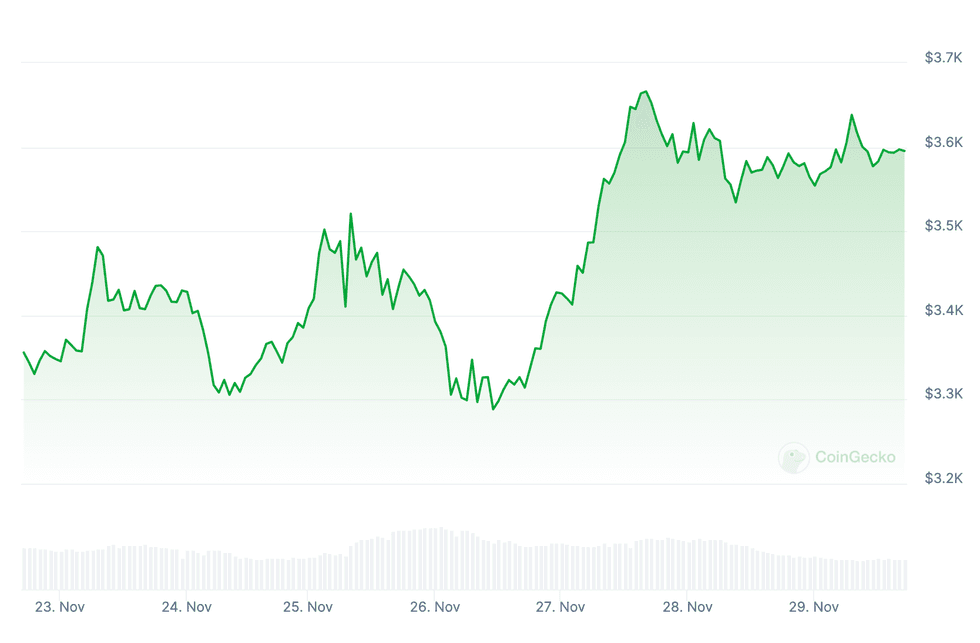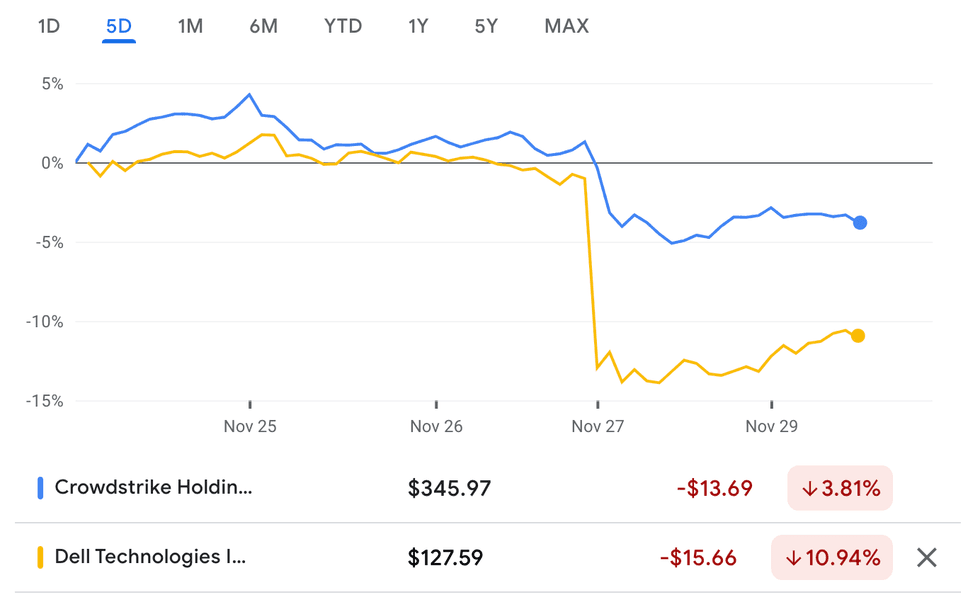Tech 5: Microsoft, Google Face New Antitrust Action, Ether Rallies
In other news, California Governor Gavin Newsom shared plans to reintroduce an EV rebate to offset a repeal of the federal EV tax credit.

Ether outperformed this week as Bitcoin's ascent paused around US$98,000.
Meanwhile, Microsoft (NASDAQ:MSFT) became the latest of the Big Tech firms to come under scrutiny by the US Federal Trade Commission, and the Biden administration finalized its milestone deal with Intel (NASDAQ:INTC).
Stay informed on the latest developments in the tech world with the Investing News Network's round-up below.
1. Bitcoin pulls back as Ether outperforms
Bitcoin pulled back at the start of the week following a rally toward US$100,000 last Friday (November 22).
After setting a new all-time high of US$99,645, the cryptocurrency struggled to stay above US$98,000 over the weekend, eventually falling as low as US$92,058 on Monday evening. Bitcoin declined even further to US$90,911 as the markets wrapped on Tuesday, marking its lowest valuation of the week.
On Wednesday, following Fox News reports that the Trump administration would move to hand more power to crypto regulation to the Commodity Futures Trading Commission, Bitcoin rallied to an intraday high of US$97,360. Investor confidence also rose due to weekly inflation numbers that suggested a resilient economy and a strengthening job market, both of which typically bolster risk appetite. As markets wrapped, Bitcoin was ahead by over 6.5 percent in 24 hours.
It traded sideways on Thursday as US markets celebrated Thanksgiving, and started Friday strong with a brief surge to US$98,680 in early trading before pulling back and wrapping the day around US$97,500. As of 6:00 p.m. EST Friday, Bitcoin was down 1.9 percent for the week, trading at US$97,485.

Ether performance, November 23 to 29, 2024.
Chart via CoinGecko.
Meanwhile, Ether showed signs of a resurgence, climbing to over US$3,500 for the first time since June on Monday. While it quickly pulled back to a weekly low of around US$3,280 on Tuesday afternoon, Ether climbed steadily Wednesday to hit a weekly high of US$3,666 as Asia’s markets opened.
Block Scholes and Bybit Analytics released a report on Thursday observing a US$8.9 billion surge in Ether open interest, estimating its price could top US$4,000 before Donald Trump takes office on January 20.
Ether traded in the range of US$3,550 and US$3,650 for the remainder of the week. As of 6:00 p.m. EST Friday, it was up 8.9 percent for the week, trading for around US$3,590.
2. Dell, CrowdStrike fall following Q3 reports
Dell (NYSE:DELL) and Crowdstrike (NASDAQ:CRWD) are down 10.94 percent and 3.81 percent, respectively, for the week after both companies delivered quarterly reports that left shareholders dissatisfied.
Shares of Dell fell by over 12 percent on Wednesday morning after the company’s Q3 2025 results, released after the closing bell on Tuesday afternoon, revealed declining revenue for its PC business. Dell’s Client Solutions Group revenue declined by 1 percent year-over-year in Q3 to US$12.1 billion, despite the increase in demand for PCs equipped with AI anticipated by analysts.
“The PC refresh cycle is pushing into next year,” the company’s CFO Yvonne McGill said on a call with analysts after the results were released.
Meanwhile, Infrastructure Solutions Group revenue rose at an annual rate of 34 percent to US$11.4 billion. Total revenue grew 10 percent to US$24.4 billion, missing the average analyst estimate of US$24.6 billion. Adjusted earnings were US$2.15 per share, above with the average estimate of US$2.06.
Additionally, Dell's Q4 2025 revenue outlook of US$24.5 billion fell short of analyst expectations of US$25.57 billion, leaving shareholders unimpressed despite some positive data points.
Shares of Crowdstrike opened 1.6 percent lower and fell by over 3 percent in early trading on Wednesday after a lackluster earnings report for Q3 2025.

Dell and Crowdstrike performance, November 23 to 29, 2024.
Chart via Google Finance.
CrowdStrike's CFO, Burt Podber, emphasized the company's strong quarterly performance. During an earnings call, he highlighted a growing sales pipeline and expressed optimism about finishing the year with momentum “despite expected headwinds from the July 19 incident,” referring to the global outage that temporarily crippled the cybersecurity defenses of countless organizations worldwide.
The event could explain the company’s adjusted earnings per share forecast to a range of US$0.84 to US$0.86 for Q4, slightly below the analyst expectation of US$0.87. The company’s total operating expense increased nearly 40 percent compared to the same period last year.
On a more upbeat note, CrowdStrike's Q3 sales surpassed predictions, reaching US$1.01 billion, and its adjusted profit per share of US$0.93 exceeded estimates of US$0.81 per share.
Additionally, CrowdStrike increased its full fiscal year revenue forecast to between US$3.92 billion and US$3.93 billion, higher than the anticipated US$3.9 billion.
3. Microsoft latest to be investigated by FTC, Google faces lawsuit in Canada
The US Federal Trade Commission launched an antitrust investigation into Microsoft on Wednesday.
According to sources for Bloomberg, who first reported the news, the FTC has been interviewing business partners and competitors for over a year, and has requested the company turn over information regarding all aspects of Microsoft’s business in a document that’s “hundreds of pages long.”
Sources familiar with the matter say that the ongoing investigation is heavily focused on Microsoft's practice of bundling its popular office productivity and security software with its cloud products.
Microsoft opened 0.71 percent lower on Friday morning following the news but recovered by the end of the shortened trading day. Its stock is up 2.93 percent for the week.
FTC regulators will reportedly meet with Microsoft executives next week. Neither organization has issued a formal comment on the situation.
This is the fifth investigation launched by FTC Chair Lina Khan in recent years, and likely one of the last before she steps down in January. President-elect Donald Trump has not yet named Khan's successor.
Meanwhile, Canada’s Competition Bureau announced it was suing Google (NASDAQ:GOOGL) for anti-competitive practices in the online advertising market, adding to the company’s mounting list of legal problems.
“The Competition Bureau conducted an extensive investigation that found that Google has abused its dominant position in online advertising in Canada by engaging in conduct that locks market participants into using its own ad tech tools, excluding competitors, and distorting the competitive process,” Matthew Boswell, Commissioner of Competition, said in the press release. “Google’s conduct has prevented rivals from being able to compete on the merits of what they have to offer, to the detriment of Canadian advertisers, publishers and consumers.”
4. Biden admin finalizes US$7.9 billion CHIPS funding for Intel
The Biden administration has finalized its deal with Intel for nearly US$7.9 billion in federal grants for chip manufacturing in Arizona, Ohio, Oregon and New Mexico. This amount, slightly less than the initially proposed award of US$8.5 billion, will be used to boost chip manufacturing in these locations.
“The award will directly support Intel’s expected US investment of nearly US$90 billion by the end of the decade, which is part of the company’s overall US$100+ billion expansion plan,” President Joe Biden said in a statement.
The company will receive at least US$1 billion this year based on milestones it has already reached and can begin receiving additional funds as it hits negotiated benchmarks on projects.
Bloomberg reported that government officials said the reduction in the grant wasn’t a reflection of the challenges the company’s chip business has faced this year, but instead is due to a US$3 billion grant the company is eligible for to make chips for the military. Due to a change in the financing for the military grant, some of the funds were instead taken from the CHIPS Act grant.
Although the initial deal included provisions for US$11 billion in loans, Intel opted not to utilize this option. Bloomberg columnist Mackenzie Hawkins noted that makes it the third major company to turn down government loans provided by Biden’s US$75 billion in loans available through the CHIPS Act.
Shares of Intel fell by nearly 4.5 percent on Tuesday before the markets closed.
5. California proposes renewed EV rebates excluding Tesla
California Governor Gavin Newsom shared plans to create a new version of the state’s Clean Vehicle Rebate Project (CVRP) and offer state rebates for electric vehicles (EVs) if President-elect Donald Trump follows through on campaign promises and eliminates the Biden-era federal EV tax credit.
The CVRP was a state program funded through California’s Greenhouse Gas Reduction Fund that offered rebates to residents who purchased or leased eligible new zero-emission vehicles. It ran from 2010 until it was closed on November 8, 2023, after funding was exhausted.
Governor Newsom’s office told Bloomberg on Monday that the current plan included market share proposals that could exclude models made by Tesla (NASDAQ:TSLA), but reiterated that the details of the proposal would first need to pass through the regular legislative channels.
“It’s about creating the market conditions for more of these car makers to take root,” the governor’s office told Bloomberg.
Tesla CEO and Trump’s pick as head of the newly-announced Department of Government Efficiency, or DOGE, Elon Musk was quick to fire back, posting his thoughts on X: “Even though Tesla is the only company that manufactures their EVs in California! This is insane.”
Despite the bump in the road — Tesla closed down over 6 percent on Monday — the company ended the week slightly ahead by 1.26 percent.
Don't forget to follow us @INN_Technology for real-time news updates!
Securities Disclosure: I, Meagen Seatter, hold no direct investment interest in any company mentioned in this article.

